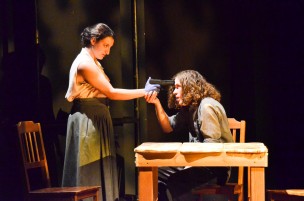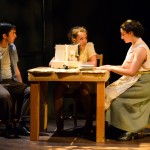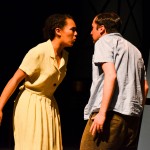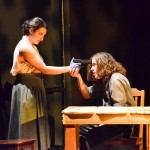A coming of age story unfolds beneath the train tracks during the Great Depression.
There are plenty of stories about growing up, but there are none like Naomi Wallace’s “The Trestle at Pope Lick Creek.” It is a play that expertly combines coming of age and coming apart, a masterfully abstract exercise in identity, age, parentage, love, and even corporeality. It is a play I had never seen, nor heard of before, with a name that immediately prompts the question, “What the hell is a trestle?” It is also a play that I’m glad the people of Wesleyan were able to see: beautiful, ambitious, chaotic.
Trestle takes place during the Great Depression and begins with two teens—the brash and enigmatic Pace Creagan (Cheyanne Williams ’17) and the reserved, angsty Dalton Chase (Jack Reibstein ’17)—under a railroad. Pace has dared Dalton to run the train that passes through their town every day. They begin practicing running the train, becoming more and more enthralled with one another, sharing hopes, fears, mourning, abstraction, and developing a strange, ethereal love. Interspersed with these scenes are glimpses into Dalton’s home, with his mother (Elli Scharlin ’18) and father (Connor Boughton ’15) breaking under the strain of their financial troubles and the weight of their own beings. There are also several scenes in a jail cell with a strange, funny, sad prison guard (Thomas Van de Pas ’17) attempting to understand self-destruction in the people he’s guarding through the contexts of other animals. The three worlds of “Trestle”—the home, the train, and the prison—converge and diverge to thrilling narrative and metaphysical effect.
This production of “Trestle” really leans into the ambition of the show. Many scenes seem to take place in an anti-place, an almost-magical world in which a plate can temporarily repair a broken man, a chemical burn can radiate with blue light, and a shadow-puppet can be talked about with hushed reverence. The set, mainly consisting of four cross-hatched trestles, dances with light and shadow, exaggerating the surrealism of the play’s bleak anti-world.
It’s a well-designed and well-directed show, something that strengthens the individual performances. Williams brings a pronounced energy to her character, wringing a lot of humor out of a part that could have ultimately been unbearably bleak. Reibstein, the show’s de-facto lead, anchors the show with his performance, giving his character weight and youth. Scharlin and Boughton each get moments bursting with power and feeling; Scharlin desperately tries to hold her world together, and Boughton’s has already fallen apart. And Van de Pas plays his character as a true eccentric, gaunt, grim, and unbelievably strange. Each of these characters have true standout moments: Williams’ interaction with a small broken engine, Boughton’s careful despair punctuated by bursts of emotional power, Scharlin’s wit and tragedy bathed in light, pre-intermission, Reibstein’s quiet and devastating prison scenes, and Van de Pas, impersonating a turtle, wringing out humor and pathos in equal parts.
This is a show that decontextualizes physical and mental associations. Love and contact, despair and volume, absence and presence. This makes the abstract nature of the performances resonate, but sometimes works in the show’s disfavor. There are moment that feel off-balance and decentered, without something to hold onto from an audience perspective. Oddly enough, this happened more in the middle of each act. This is particularly the case in the middle exchanges between Pace and Dalton.
Those moments tend to repeat themes and motions a little too often, which weakens both characters. The momentum picks up at the end of each act, but changes in staging, and more of a concrete center to the action would have made the show more propulsive, even in its most abstract and contemplative.
“Trestle” is a production that aims very, very high, and accomplishes much of what it attempts to achieve. It’s not perfect, but it’s impressive and powerful. It was thought-provoking, and brought onto the stage moments of supreme power. That’s something that the entire “Trestle” team should be proud about, and something it was a privilege to witness.
- Lianne Yun, Assistant Photo Editor



